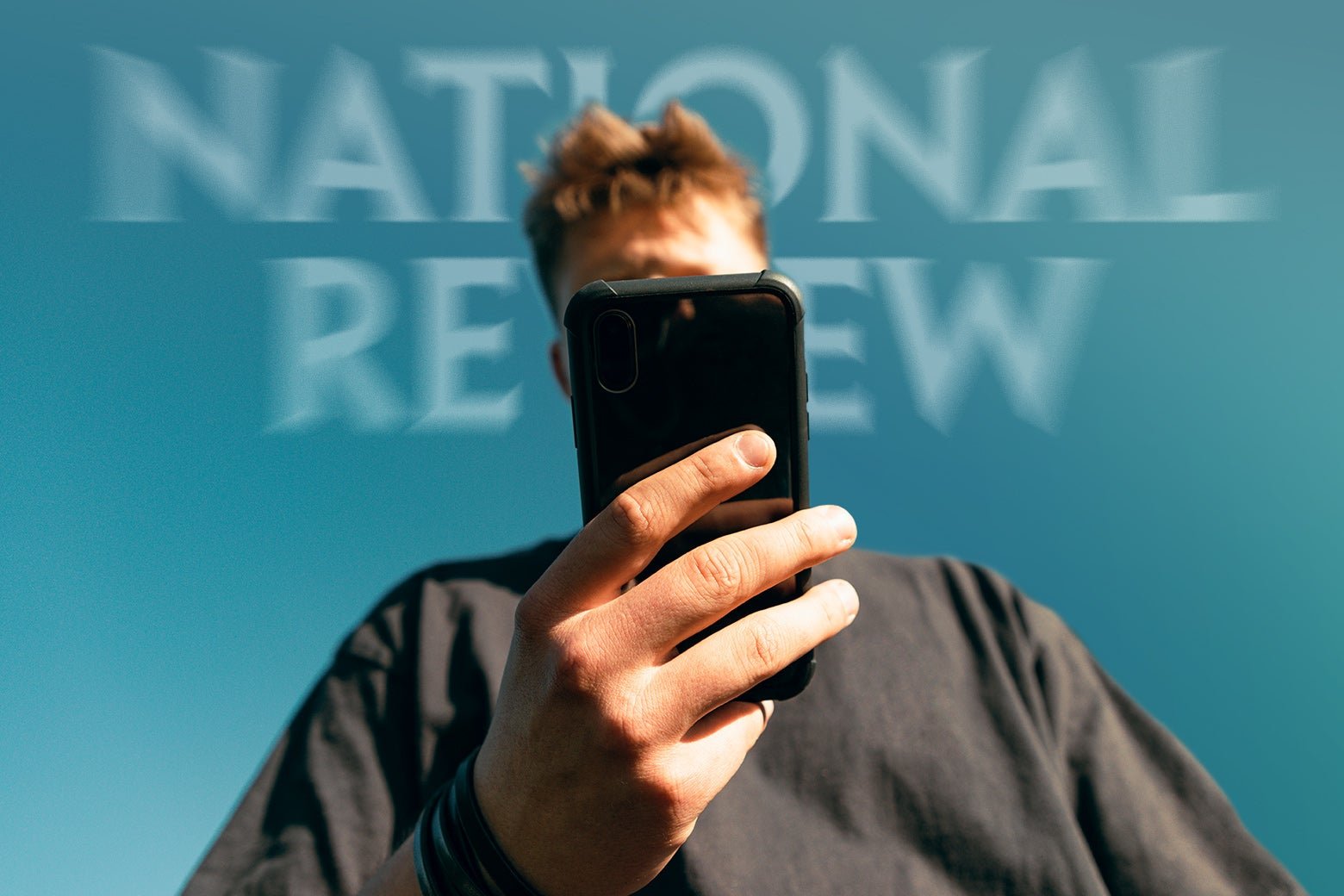Sign up for the Slatest to get the most insightful analysis, criticism, and advice out there, delivered to your inbox daily.
As with many other Obama-voting millennials, I never had much use for conservative media. My political coming-of-age coincided with a moment when information streams were already splintering into deeply partisan lanes, a process that became supercharged in the MAGA era. Ascendant irritants like Ben Shapiro and Charlie Kirk determined that delicate liberals were not their target demographic and never made much of an effort to bring us into the fold. No hard feelings, really. I only have so much time on this Earth; I’d like to spend as little of it as possible listening to what Will Cain has to say. So trust me when I say that I can’t quite come to grips with my new habit, one that I’m hugely embarrassed to be admitting in public. You see, ever since Trump won a second term, I’ve found myself reading quite a bit of National Review. In fact, I’d reckon that I’ve been on the site’s homepage almost every single day.
I’m not sure what exactly has come over me. National Review was—and probably still is—the nation’s standard-bearer editorial vessel for conservative thought, so, naturally, it is well outside my wheelhouse. The publication was founded in 1955 by the legendary gadfly William F. Buckley Jr. as a salon for the various right-leaning fraternities in American life: fire-eating libertarians, orthodox Catholics, conspiratorial anti-communists. While the erosion of the print-media business has squeezed the magazine into more of a boutique operation than it was during its earlier decades of thought leadership, it nonetheless remains one of the barometers of the conservative movement. Historically, its demeanor is known for being more erudite, more citified, and more openly Ivy League than the car-dealership Republican majority currently occupying Capitol Hill. But nonetheless, National Review always managed to marry its cosmopolitan respectability with some good old-fashioned rightward crankiness—bitterly haranguing college-aged activists, Planned Parenthood doctors, congresswomen that dare wear white to the State of the Union, and many other brain-dead culture-war flashpoints that turn Thanksgiving dinner sour after a couple bottles of wine.
This might make you think that I’m hate-reading the magazine. Oftentimes, I probably am. But if I’m being honest with myself, my postelection addiction to National Review does not come from a sensation I’d describe as animosity. Instead, I think I’ve become mesmerized by the extremely noticeable agony of its impossible posture, one that has become incoherent within this cartoonish state of affairs. This publication exists as a beacon for serious conservative values at an extremely unserious time, and, naturally, it seems to lapse further out of rhythm with an unhinged Republican caucus every single day. How do you broker detente with a Trump administration that has taken on a late-Romanov odor of feral decline? The answer, of course, is that you don’t, and you can’t. But National Review must try anyway.
In that sense, if you’re looking for a political formation that’s somehow even more adrift than the shattered establishment Democrats, I do recommend following my cue and clicking over to National Review’s homepage. It’s a sight to behold. Yes, the magazine toasts Trump’s successes in the winnowing political avenues where the two forces share common ground. National Review has published some downright psychotic tributes to the president’s deportation policy and has paid lip service to some of his more outré policy ideas (the magazine has been amenable to the capture of Greenland, and the “Gulf of America” situation). But the overarching tone, across the board, is oddly diffident. National Review is neither victorious nor defeated within its Republican trifecta; if it has a binding conceit, it seems to be a nihilistic embrace of the inevitable calamity that awaits us here at the end of the American century. On that point alone, I can relate.
So, National Review tracks our age of humiliation. The magazine is currently home to an entire editorial subdivision dedicated to Trump’s berserk tariff program. Headlines include: “Here Comes Trumpflation,” “Warning Lights Are Flashing,” and “The Trump Slump.” Elsewhere, in the “News & Policy” section, the stories become even more abstract and psychically displaced. My favorites include “Does Trump Know Why He Was Elected?” and the quite reasonable “Mindlessness Is Still Not a Virtue.” The staunch opposition to MAGA-dom that the magazine once proudly championed, like when the editorial board rejected the presumptive Republican nominee out of hand in early 2016, has become threadbare by many long years of defeat. That has left it in the wilderness. National Review is not pro-Trump, nor anti-Trump; instead, it is something like anti-anti-Trump—perfectly willing to criticize the president’s gracelessness, petulance, and myriad boneheaded decisions, but nonetheless paralyzed by the undeniable reality that the magazine’s cerebral vision of conservatism has lost all currency. It is the great irony of National Review: The left is demolished, but given the circumstances of its undoing, the magazine doesn’t have the capacity to savor its ultimate accomplishment. From here on out, it watches the world burn.
Those are shaky foundations for an editorial perspective, and frankly, I think that’s why National Review has been lapped by a slew of other non-MAGA conservative media projects. There is the surprising influence of the Bulwark, co-founded by the old-school neocon Bill Kristol—an ostensibly right-wing salon that advocates for some eyebrow-raising ideological reforms in the Republican Party. (For instance, the Bulwark has sniped at Mike Johnson’s intentions of stripping down Obamacare.) Meanwhile, the Dispatch, co-founded by former National Review editor Jonah Goldberg, takes basically the same approach, without the same brazen Democrat-courting ovations. (When I filed this article, the homepage took aim at both David Zweig and RFK Jr.) Bari Weiss’ the Free Press follows a more strident, smarmier, but similar version of this blueprint, sometimes with BuzzFeed-esque inquisitions into the administration that—at the very least—orbit around the right questions. (“Is Donald Trump Breaking the Law? Seven Experts Weigh In.”)
National Review, meanwhile, has cemented its bizarre, lukewarm MAGA-agnostic demeanor, which is untenable in a political media age that demands either complete fealty or total resistance to the president. It has left the magazine detached from a corresponding movement, and I think that’s largely because for as much as National Review loathes Trump, it will always hate liberals more. The magazine’s “Woke Culture” section brims with breathless coverage of the remote outer rim of perceived progressive excesses. (You can read two—two!—stories about a trans woman competing in fencing at a liberal arts college.) Similarly, National Review continues to open its pages to single-issue wing nuts from the depths of the far-right fever swamps, including psychotic anti-IVF Catholics, sweaty homeschooling advocates, and Armond White, the veteran whack-job film critic who, in a recent review, asserted that Moana 2 was a trans allegory. If you come to National Review expecting a Bulwark-style allergy to partisan warfare, you aren’t going to find it. The magazine sticks to its guns, and people like me are in its sights. Tellingly, during a recent fundraising drive, National Review rallied its donors with a straightforward message: “The Left Is Only Hibernating.”
In other words, it can be difficult to detect exactly how much distance there is between National Review and Trump on the issues, rather than the vibes. Frankly, the two entities find themselves simpatico on some of the president’s most monstrous measures. The magazine treated the campus Palestine protests like the siege of Fallujah, with one writer applauding Trump’s decision to strip Columbia University activist Mahmoud Khalil of his green card. More chillingly, when Tufts University student Rumeysa Ozturk was black-bagged for no apparent reason, editor-in-chief Rich Lowry retorted with a piece headlined, “No, People Aren’t Being ‘Kidnapped’ or ‘Disappeared.’ ” Still, those tacit approbations of MAGA-style illiberalism are consistently marbled into a magazine-wide repulsion of the broader institutional ramifications of the Trump age. It all makes for a schizophrenic read.
Honestly, I think that’s why I keep coming back. National Review has acknowledged that the advent of Trump signals a necrotic rot at the heart of American society, but the magazine has come to terms with the fact that it does not have the cachet to stop it. So, rather than expressing full-throated dissent, it has instead fallen back on its eternal bugaboos, staring directly into the void and chanting its founding dictums: Liberals are annoying and bad, and all of this is probably their fault, anyway. I admire the panache. Even here, when we’re both about to die, National Review wants to remind me that I will always be its enemy.
Slate is published by The Slate Group, a Graham Holdings Company.
All contents © 2025 The Slate Group LLC. All rights reserved.
The Most Exquisite Daily Display of Republicans Who Are Still Trying to Act Normal Under Trump – Slate



